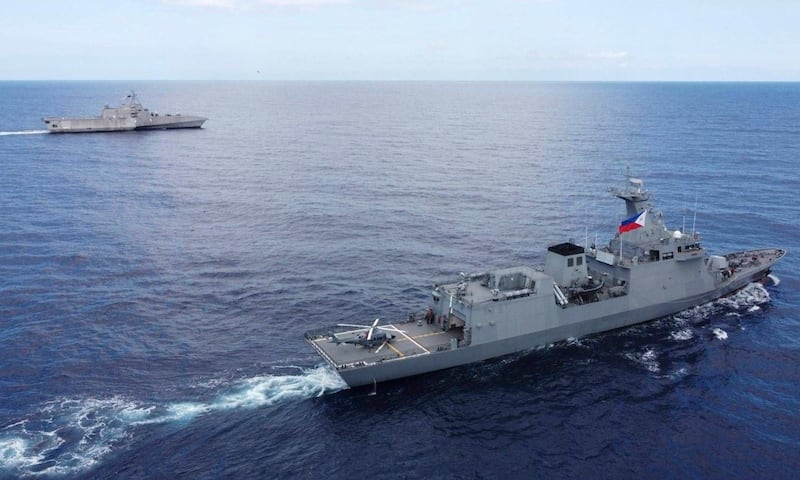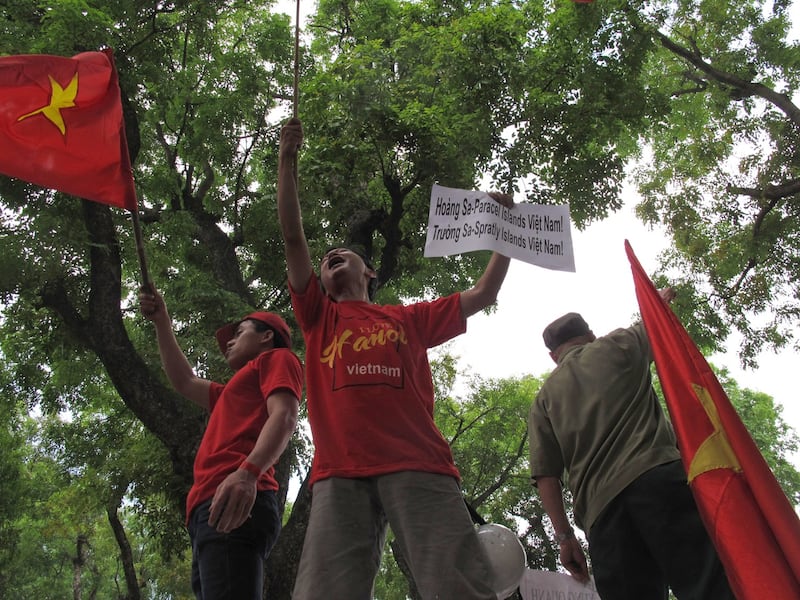Updated Dec. 7, 2023, 10:08 pm ET.
The Philippines has been leading a campaign of “assertive transparency” in dealing with China in the South China Sea, deemed successful by analysts and officials.
"Assertive transparency describes the tactic of deliberately seeking out the dark spaces where gray zone actors conduct their illegal, malign and coercive acts, and then exposing them to public view," said Ray Powell, a maritime analyst from Stanford University's Gordian Knot Center for National Security Innovation who coined the term.
Gray zone activities are generally not explicit acts of war but can be harmful to a nation's security. In gray zone situations, China has been utilizing the coast guard and its maritime militia "to manage the intensity of disputes so they do not lead to armed conflict, and to exert pressure on adversaries, thereby gradually expanding China's rights and interests," according to a report published this year by Japan's National Institute of Defense Studies.
Manila’s answer was to embark on a campaign of assertive transparency, or – as Philippine officials put it – a transparency initiative, which “has proved to be a game-changer,” according to Powell.
Another analyst, Collin Koh from the S. Rajaratnam School of International Studies (RSIS) in Singapore, said the Philippines’ open publicizing of maritime incidents with China and calling out Chinese aggression or intimidation, thus imposing reputational costs on China, “has not been observed before in Southeast Asia.”
"Manila's new 'name and shame' strategy does appear to have put Beijing on the back foot, perhaps due to the element of surprise more than anything else," Koh wrote in Fulcrum, an analysis site by the research center ISEAS – Yusof Ishak Institute, also in Singapore.
The analyst noted that so far, this strategy has not met with any backlash nor have there been any indications of coercive economic reprisals from China since it started earlier this year.
Trade and investment data appeared to be unaffected, said Koh, and the flare-ups in the sea “have not had any discernible negative impact on Chinese investor interest in the Philippines, especially in renewable energy and critical minerals.”
Koh argued that China “probably does not want to cast itself as an increasingly less reliable and therefore unattractive trade and investment partner.”
“Moreover, if China desires to uphold its image as a proponent of common development in the Global South and a strong supporter of economic integration, weaponizing trade and investment against the Philippines may be foolhardy.”
Keep pushing for transparency
“I think we have been very effective with our transparency initiative,” the Philippine coast guard’s spokesman Cdre. Jay Tarriela told local radio station DZBB.
“When we started publicizing these things happening in the West Philippine Sea … every time there is [China’s] swarming and we publicize it, we can expect the Chinese government to pull out those Chinese maritime militia ships regardless of locations,” said Tarriela, referring to the part of the South China Sea that falls within Manila’s jurisdiction.
“We did that in Sabina Shoal, we did that in Iroquois Reef and now we have been doing that in Julian Felipe,” the spokesman said. Julian Felipe Reef, internationally known as Whitsun Reef, is another disputed feature in the South China Sea where the Philippine coast guard spotted more than 100 Chinese maritime militia vessels over the weekend.
“The total number of ships was 135 when we publicized it but a few days later this number went down to 28. We are still hoping that they will leave in the next coming days,” Tarriela said, “We'll keep on pushing for transparency, telling the world that the Chinese maritime militia are still occupying our exclusive economic zone [EEZ].”
An EEZ gives a state exclusive access to the natural resources in the waters and seabed.

Manila’s strategy has received praise from some of its neighbors.
“The Philippine policy is very good and timely,” said Aristyo Rizka Darmawan, a senior researcher at the Center for Sustainable Ocean Policy at the University of Indonesia.
He said that by publicly sharing information about incidents in the sea, the Philippines could rally support from other countries and pressure China to stop its aggressive actions as well as to abide by international law.
“I personally think Indonesia should have a similar policy of openly protesting or responding to China,” the researcher told BenarNews, an RFA-affiliated news service.
“But I sometimes doubt the diplomatic strategy of the Indonesian foreign ministry, which does not want to expose or pressure China too much in the Natuna Islands for various considerations,” he added.
Andreas Aditya Salim, co-founder of Jakarta-based think tank the Indonesia Ocean Justice Initiative, agreed that transparency is good.
”However, I don't think other countries can or are willing to adopt that approach. Indonesia, for example, has a ‘no megaphone diplomacy’ approach.”
Chinese fishing boats and coast guard vessels have been accused of entering Indonesia’s EEZ near the Natuna Islands and Chinese survey ships of loitering in the North Natuna area, where Indonesia’s oil and gas exploration is underway.
New name for old approach?
Another neighbor of the Philippines, also a claimant in the South China Sea – Vietnam – may have played the assertive transparency card before, said a Vietnamese researcher.
“Basically it is a new name for some old tactics – ‘naming and shaming’ is one of them,” said Nguyen The Phuong, who is doing a PhD in maritime security and naval affairs at the University of New South Wales (UNSW) in Canberra, Australia.
“Vietnam did employ this approach, for example in the so-called HD981 incident, when Hanoi allowed journalists to the site of the dispute to report on what was happening,” said Phuong, “It was also assertive transparency.”
The incident, dubbed the 2014 China-Vietnam oil rig crisis, erupted after China moved its oil platform Hai Yang Shi You 981 (known as HD981 in Vietnam) into the waters near Vietnam's coast.
After Hanoi’s public protests and a stand-off that lasted more than two months China withdrew the rig.
“Hanoi will consider case by case and will be willing to do that again should another crisis occur,” said the Vietnamese researcher. “The Philippines wants to remain strong and will use that approach more forcefully. Vietnam, on the other hand, will be more careful.”

Differing with Manila, Hanoi has always maintained backdoor channels in dealing with Beijing, including the relationship between the two ruling communist parties that can serve as “an important mechanism for de-escalation,” according to Nguyen The Phuong.
Manila has backing from its ally the United States, which constitutes “a significant factor but could also lead towards further escalation,” he added.
The U.S. has repeatedly said that Article IV of the 1951 U.S.-Philippines Mutual Defense Treaty “extends to armed attacks on Philippine armed forces, public vessels, and aircraft – including those of its Coast Guard – anywhere in the South China Sea.”
“My sense is that the other claimants have mostly been satisfied to let the Philippines be at the center of Beijing's attention,” said Ray Powell who runs a project called SeaLight at the Gordian Knot Center for Innovation.
“This allows them to avoid the direct blowback while quietly chiding Manila on how it doesn't know how to ‘manage’ its China relationship as deftly as they do,” Powell told RFA.
However, Manila is shifting the spectrum of acceptable pushback.
“This should give other countries more confidence to respond to future provocations, since the Philippines has demonstrated that countries can resist China’s aggression and not only survive but even thrive to some extent,” said the analyst.
Jason Gutierrez in Manila and Pizaro Gozali Idrus in Jakarta contributed to this report.
BenarNews is an RFA-affiliated online news organization.
Edited by Mike Firn and Taejun Kang.
Updates 3rd graf to correct sourcing.
